Rabies is a major public health problem that occurs in more than 150 countries and territories, with an estimated 59 000 deaths annually worldwide. Once clinical symptoms appear, rabies is fatal. Dogs contribute up to 99% of all rabies transmissions to humans.
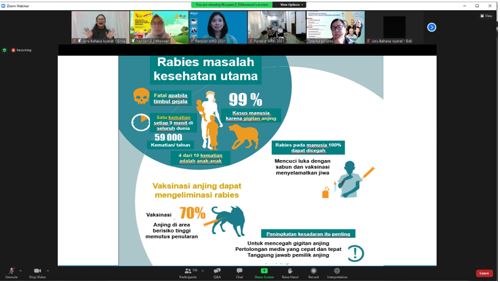
WHO delivered presentation update facts on rabies and effective risk communication in the World Rabies day webinar, 29 September 2021 (Credit: Endang Wulandari/WHO).
In Indonesia, rabies is endemic in 26 out of 34 provinces. Eight free rabies provinces are Riau Islands, Bangka Belitung Islands, DKI Jakarta, Central Java, DI Yogyakarta, East Java, Papua and West Papua. WHO in collaboration with FAO and other partners supported the Government of Indonesia in rabies control. These include development of the national rabies elimination road map 2030 and capacity building for rabies control, such as Joint Risk Assessment (JRA) for zoonoses, including rabies in 10 priority provinces.
Using World Rabies Day momentum on 28 September 2021, WHO, FAO and partners supported the Government of Indonesia for advocacy engaging multisectoral commitment and collaboration at all levels for rabies control.
WHO delivered a presentation on updates on rabies and effective risk communication for rabies control in a webinar organized by South Sulawesi Government on 29 September 2021. The webinar was also supported by the Ministry of Health (MoH), the Ministry of Agriculture (MoA), and partners including FAO and the Australia Indonesia Health Security Partnership (AIHSP) programme. During webinar, WHO presented:
- Updates on global rabies disease and economic burden.
- Global strategic plan to end human deaths from dog-mediated rabies by 2030, with three objectives (1) to effectively use vaccines, medicines, tools, and technologies that will stop dog rabies transmission and reduce the risk of human rabies deaths; (2) to generate evidence-based guidance and high-quality data to measure impact and inform policy decisions and (3) to harness multi-stakeholder engagement to sustain commitment and resources.
- Updates and innovations on rabies control, including intradermal rabies vaccination that induces a similar immune response to intramuscular injection. This offers potential cost saving.
- Effective risk communication and community engagement where the community is the key player for rabies control.
During the webinar, MoH presented risk communication using one health approach for rabies control, while MoA delivered a presentation on government commitment towards rabies elimination in Indonesia by 2030. FAO presented on community empowerment for rabies control.
Highlighting integrated surveillance for zoonoses control, WHO and FAO supported MoH and MoA to conduct a webinar on 30 September on EID and Zoonosis Information System (SIZE). This demonstrated the implementation of SIZE for rabies control in four districts (Bengkalis, Boyolali, Ketapang and Minahasa). SIZE is a health surveillance information system that connects MoH Early Warning Alert and Response System (EWARS), animal health information system (iSIKNAS) and wildlife health information system (SehatSatli). SIZE aims for early detection of emergence of diseases in human and animal populations. It facilitates an information-sharing platform for evidence-based decision-making in responding to zoonoses alerts. SIZE will be further developed to collaborate with the National Research and Innovation Agency (BRIN) to include a risk mapping feature. SIZE implementation at four districts has demonstrated improved timely detection and response for rabies. It serves as an effective tool to detect and control diseases through communication, information and data sharing for timely joint field investigation and efficient and effective responses for rabies.
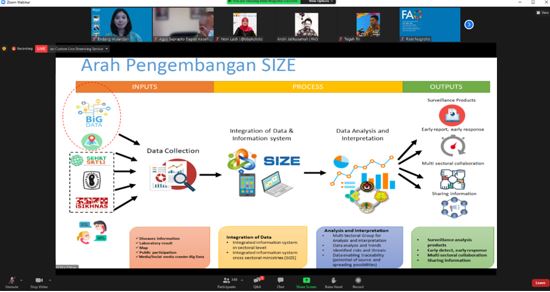
Coordinating Ministry of Human Development and Cultural Affairs presented Emerging Infectious Diseases and Zoonosis Information System (SIZE) used for rabies in four pilot sites in a webinar on 30 September 2021 (Credit: Endang Wulandari/WHO).
Anticipating a shortage of anti-rabies serum, WHO supported MoH to procure 600 vials of Human Rabies Immunoglobulin (HRIG) for 21 rabies endemic provinces (Medan, Padang, Pekanbaru, Jambi, Palembang, Bengkulu, Banten, Bandung, Banjarmasin, Palangkaraya, Pontianak, Samarinda, North Kalimantan, Gorontalo, Central Sulawesi, Southeast Sulawesi, South Sulawesi, West Sulawesi, West Nusa Tenggara, East Nusa Tenggara, and Maluku) and also to maintain a buffer stock at the MoH.
Whole society multisector engagement using the one health approach at all levels is a key to successful rabies control towards eliminating dog-mediated rabies.
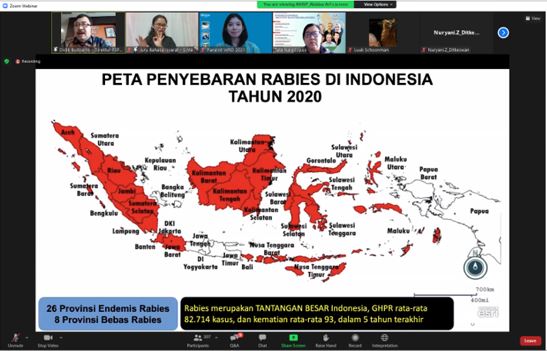
MoH Director Vector Borne Diseases Control presented rabies situation in Indonesia during World Rabies Day webinar, 29 September 2021
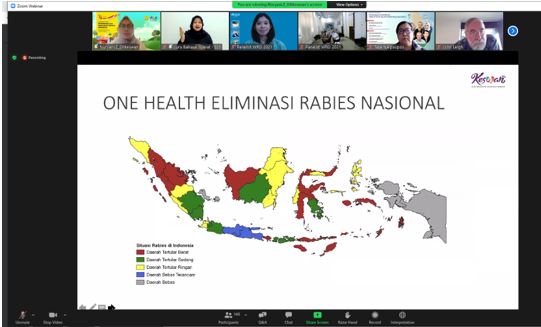
MoA Director Animal Health, presented one health national rabies elimination road map on World Rabies Day webinar, 29 September 2021
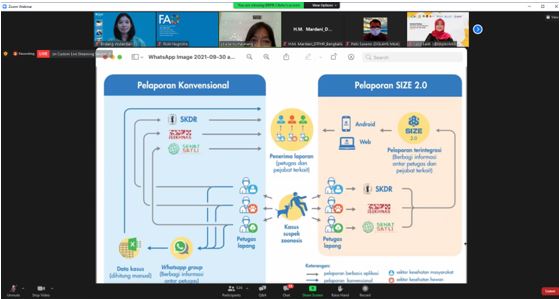
South Sulawesi District Health Officer (DHO) presented lessons learnt on the implementation of SIZE for rabies detection and control in a webinar, 30 September 2021.
